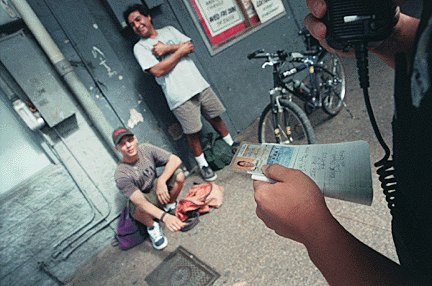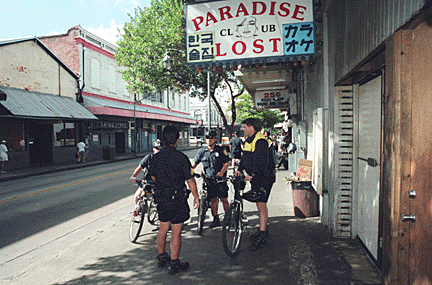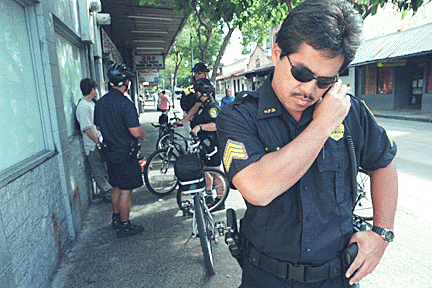


Pedal police a force on wheels
HPD officers 'know the heartbeat'
By Jaymes K. Song
of the community and help to bring
down crime in Chinatown
Star-BulletinFive years ago, Sgt. Clayton Saito would see flickers of flame at night throughout Chinatown.
They were from druggies lighting crack pipes in front of restaurants, in alleys and on street corners.
Now, thanks to Saito and the downtown bicycle detail, the flickering has started to die.
"They have made a major impact in bringing policing to the community," said Bob Gerell of Gerell Management Inc., a property-management business for about 200 businesses, mainly in Chinatown.
"Before, they would ride around in police cars or in those Cushman things. Now, they ride on the sidewalks and talk to people and the owners of businesses," he said. "They're more aware of patterns. They know the heartbeat from moment to moment in the community. They're more intimate."
Saito heads one of the Honolulu Police Department's most successful programs, established at the end of 1994. The bike patrol was created to increase police presence and to tackle the drug problem, said Maj. Henry Lau, commander of the Honolulu patrol district.
In the past three years, Saito and his five officers have swept through Chinatown, making 2,427 arrests and handing out 7,306 citations.

Drug arrests dropped last year because there was less blatant use on the streets, Saito said. And because officers had more time due to less arrests, they were able to write more citations, doubling from 1,385 in 1996 to 3,362 in 1998."Bicycles are very effective," said Police Chief Lee Donohue. "The officers are able to patrol areas that are inaccessible to cars and can approach suspects without being detected."
The cycles are able to get to a congested scene faster than a police car by going against traffic on one-way streets or cutting through alleys; cover more area than an officer on foot; and have more interaction than an officer in a patrol car.
"It's an excellent method of patrol," Saito said. "We have contact with the community and we have contact with the criminals."
Bicycle officers also can chase down a fleeing suspect better than any method of transportation. "We haven't lost one yet -- knock on wood," Saito said.
"Wherever they have been, they have made a lot of arrests," said U.S. Attorney Steven Alm, noting that many of the arrests have been under the Weed-and-Seed Program, under which drug dealers face tougher federal laws.
Chinatown is one of three areas -- including Waikiki and Ala Moana -- where the department has a fulltime bike patrol. Police districts such as Windward Oahu and Waipahu have part-time bike patrols.
Lau plans to expand the bike patrol in the Kakaako and Kapiolani areas because of its success.
Even after being recognized as officer of the year and one of the nation's "Top Cops," Saito remained modest about his success with the bicycle detail. He credited the partnership with beat officers, the community-policing team, crime-reduction unit and the U.S. attorney's office.
Unlike beat officers, bike detail members aren't dispatched to police calls. Members initiate their cases by either seeing or hearing about the crime -- which takes time and effort -- making the hundreds of arrests every year impressive.
The requirements to become a bicycle officer are simple: Be in good shape and be motivated. All of Saito's officers are in their 20s or early 30s, which makes Saito "one of the grandfathers" at age 42.
Recalling his first day of training brought back memories for Saito, whose last time on a bike prior to joining the patrol was in elementary school.
"I wasn't in shape," he said, laughing. "I was hurting. My butt was sore. My legs were sore. The second day, I couldn't walk."
Now, he's one of five nationally certified instructors at the department who trains new officers.
Officers ride about 10 to 15 miles per day while on duty. The training run is from the Beretania Street police station to the Koko Head shooting range, then back to the station.
Training also includes nutrition, immediate braking, running off the bike, tight maneuvering, carrying the bikes upstairs and using bikes as a barrier or weapon.
And that all-important people interaction.
"Clay's very community-oriented," Lau said. "He listens to the community. The Chinese society really loves him. He's been very good for our district."
The community, in turn, has noticed the difference.
"They feel like they're part of the community," Gerell said. "Police have become part of the neighborhood."
The 24-speed mountain bikes cost about $2,200 fully equipped -- much cheaper than a $25,000 squad car, Saito said. Maintenance, too, is cost-effective and the frames have a lifetime warranty, he added.
But there are downsides to being a bike cop.
The officers are exposed to the weather, the bikes can't carry as much gear as a car, and the officers are not protected.
"One rear-view mirror clips you, and you're gone," Saito said. "It's not if' you're going to fall, it's when."
"And people don't respect bicyclists," said one officer, Tara Amuimuia.
The bike cops also got ridiculed by fellow officers because of their shorts.
"We were getting razzed quite a bit," said Saito. "They weren't used to the legs.
"They didn't know what we could do," he said. "But when they found out, they stopped teasing us."

Sgt. Clayton Saito: The
By Jaymes K. Song
push behind the pedal
Star-BulletinFour police officers charge out of the Chinatown substation and hop on their mountain bikes. They pedal quickly for a half block, to where an angry woman is escorting an unruly man from a Hotel Street bar.
"He no have I.D.," the woman yells at the officers.
After talking to the man and calming the woman for 15 minutes, the officers arrest him on an outstanding warrant. He is taken away in a squad car to the police headquarters on Beretania Street for booking.
In Chinatown, bicycle officers play a pivotal role against pervasive drug and sex crimes. In the past three years, they've locked up 1,059 people for drugs.
Police say crack cocaine is still the drug of Chinatown, not crystal methamphetamine, because "crack is cheaper and it gives a quicker high."
"Sarge, it's getting busy," says one officer, scanning the monitors showing the busy streets from 14 surveillance cameras installed in November. "The cockroaches are coming out."
Most of the arrests happen on Hotel and Smith streets, says Sgt. Clayton Saito, head of the downtown bicycle patrol. And the 24-hour adult-video shops are the areas for prostitution, drugs and loiterers.
Saito enters one of those shops, into a foyer that looks like any small video store. But with a difference: the display case holds sex toys and the tapes are X-rated.
"I'm going to take a look upstairs," Saito tells the clerks as he walks through a small gate leading to the stairway. A sign on the gate reads, "STOP. Please pay the attendant." Admission to the upstairs area is $10.
Upstairs is a small lobby with a couch, a pinball machine and a soda machine, which leads to a pitch-dark corridor. The only glow comes from several television sets emitting moans and groans from the X-rated movies being played.
There are some half-dozen rooms, each with an old sofa and a 19-inch TV. Down the hall is a shower stall and a small theater where one man watches a movie.
Another man sleeps on a battered hallway couch. Saito passes him, then steps into a room where two older men are having sex. Startled, the two jump to their feet and quickly grab their clothes.
After serving 16 years with the force and the last 12 years in Chinatown, Saito has about seen it all. And the two men don't seem to surprise him.
The men are not arrested or cited, Saito explains, because they are consenting adults in a private area.
Back downstairs, Saito shows an area of closet-sized video booths where people "do their thing." The booths -- equipped with a stool, coin-operated monitor and a tissue dispenser -- are often used for prostitution and doing drugs, Saito says.
Officers complain they have a hard time busting prostitutes or people smoking drugs inside these booths because of privacy laws. At least one business is looking into getting rid of the doors or having small windows installed, Saito says.
All his rookie cops get this tour of adult-video shops, Saito explains, so they know the floor plan of the businesses and won't be taken by surprise by what they see.
"Hey, how are you today?" Saito asks a large gray-haired woman watching the street from her favorite seat at a lunch counter. "Are you feeling any better?"
The lady, who has spent the past few hours staring at Hotel Street with her friend, tells Saito she's still battling a cold. Saito wishes her well.
The interaction is what Saito enjoys the most.
A couple immediately approaches and asks directions to the Polynesian Cultural Center. Saito gives them directions, advising them to hurry before traffic gets heavy. They thank him and rush off.
"It's less intimidating to approach an officer on bicycle," he says. "Obviously because the way we're dressed. We're not fully suited -- we're in shorts and on a bicycle."
In a place as populated, colorful, lively as Chinatown, Saito knows well the constant battle against drugs and prostitution. Druggies are like "cockroaches," he says -- when police crack down on one business or area, they'll find a home somewhere else.
"Ideally, there would be no drugs, no criminal activity -- but that's not realistic," Saito says. "We just want to make it better, the best way we can."